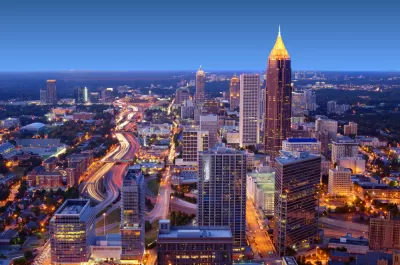The city has reinvented itself in many ways, but its residents are not reaping those benefits equally.

Atlanta has changed over recent decades and gone mainstream, with its thriving film industry, hip hop scene, upscale developments, and amenities like the BeltLine, writes Marsha Shalhoup. "However, in this majority-black city—one that has earned its prominence thanks in large part to the contributions of black Atlantans—it is still white Atlantans who are benefiting most."
She says that two factors contributed greatly to Atlanta’s transformation starting in the 1990s: the state’s HOPE scholarship program and the HOPE VI federal grant that replaced public housing with mixed-income developments. Ultimately, these programs did not help the Atlanta residents who needed it the most as income and college attendance gaps between blacks and whites widened.
Shalhoup returned to Atlanta in 2018 and says that she did not recognize parts of the city she knew well, previously rundown areas that gentrification wiped clean. "If this influx of wealth were benefiting people equally, or even sort of equally, these changes would be easier to accept. And they would be easier to accept if more had been done to preserve the affordability of these intown communities as they were transforming," she adds.
FULL STORY: It’s the best time to be an Atlantan. It might also be the worst.

Alabama: Trump Terminates Settlements for Black Communities Harmed By Raw Sewage
Trump deemed the landmark civil rights agreement “illegal DEI and environmental justice policy.”

Study: Maui’s Plan to Convert Vacation Rentals to Long-Term Housing Could Cause Nearly $1 Billion Economic Loss
The plan would reduce visitor accommodation by 25% resulting in 1,900 jobs lost.

Planetizen Federal Action Tracker
A weekly monitor of how Trump’s orders and actions are impacting planners and planning in America.

Waymo Gets Permission to Map SF’s Market Street
If allowed to operate on the traffic-restricted street, Waymo’s autonomous taxis would have a leg up over ride-hailing competitors — and counter the city’s efforts to grow bike and pedestrian on the thoroughfare.

Parklet Symposium Highlights the Success of Shared Spaces
Parklets got a boost during the Covid-19 pandemic, when the concept was translated to outdoor dining programs that offered restaurants a lifeline during the shutdown.

Federal Homelessness Agency Places Entire Staff on Leave
The U.S. Interagency Council on Homelessness is the only federal agency dedicated to preventing and ending homelessness.
Urban Design for Planners 1: Software Tools
This six-course series explores essential urban design concepts using open source software and equips planners with the tools they need to participate fully in the urban design process.
Planning for Universal Design
Learn the tools for implementing Universal Design in planning regulations.
Caltrans
Smith Gee Studio
Institute for Housing and Urban Development Studies (IHS)
City of Grandview
Harvard GSD Executive Education
Toledo-Lucas County Plan Commissions
Salt Lake City
NYU Wagner Graduate School of Public Service





























